De Nederlandse schrijver en cabaretier Kees van Kooten werd geboren op 10 augustus 1941 in Den Haag. Zie ook mijn blog van 10 augustus 2010 en eveneens alle tags voor Kees van Kooten op dit blog.
Uit: Het groot bescheurboek
“Cadeautje
We zagen het jarenlang aankomen en eindelijk is het nu dan dus gebeurd: al onze vrienden en kennissen hebben alles al. De laatste die nog wat miste was Piet want die had gek genoeg nog geen wekradio maar laat hij nu van Medea voor zijn laatste verjaardag een wekradio krijgen! Medea zelf heeft trouwens nog een tijdjelang geen stoomkrultang gehad tot ze die dus met haar vorige moederdag van Jason bekwam. Toen zei ze het nog: nu heb ik geloof ik wel zo ongeveer alles wat ik hebben wou! Dat maakt het er voor ons als een van hun beste vrienden niet eenvoudiger op, want we kunnen toch lastig met lege handen aanbellen, als we komen. En helemaal niet als je ziet wat Koos en Medea altijd voor een werk van hun avondjes maken.
Soms hebben ze zalm zelfs. En het hele kleed nemen ze op, dat er gedanst kan worden, eventueel!
Nu hebben wij de laatste vier, vijf verjaardagen van allerhande Leuke Oude Dingen gegeven want daar waren ze nogal op zo’n beetje. Maar op een gegeven moment begonnen ze Leuke Oude Dingen dúbbel te krijgen en dan gaat het hard. Zo kregen ze de vorige keer maar liefst zeven oude koekblikken waarvan ze er al vier hadden staan. En de porseleinen diertjes die Medea opgaf als je vroeg wat ze wou hebben (Oh niks. Alleen maar een porseleinen beesje. Ik verzamel namelijk zo’n beetje porseleinen beesjes) waren uitgegroeid tot een kudde van over de honderd honden, poezen, hertjes, varkens en aapjes met een enkel mannetje of herderinnetje ertussen van vrienden die in de gauwigheid zo vlug geen beesje hadden kunnen vinden. En dat zijn dan alleen Koos en Medea nog maar! Jan en Popje, Henk en Lise-Lore, Bob en Daphne en noem de hele keng maar op: stuk voor stel zitten ze vol. Alles hebben ze al, alles. En nog wat.
Affijn: 11 maart bij Nees en Carla kwamen we met ons allen hardop tot de conclusie dat iedereen alles al had. Bij die gelegenheid kreeg Carla zesmaal Elite Hotel van Emmylou Harris en drie keer De Uitvaart van Mama Grande van Gabriel Garcia Marquez. Toen hebben we dus min of meer afgesproken dat het geen zin meer had en dat we een punt achter de Cadeaux gingen zetten.”
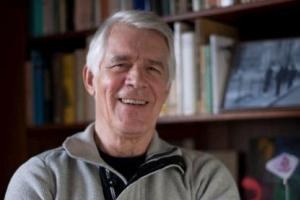
Kees van Kooten (Den Haag, 10 augustus 1941)
De Duitse schrijver Alfred Döblin werd op 10 augustus 1878 geboren in Stettin. Zie ook alle tags voor Alfred Döblin op dit blog en ook mijn blog van 10 augustus 2010
Uit: Berlin Alexanderplatz
„Das weiß ich, seufzte er in sich, daß ich hier rin muß und daß ich aus dem Gefängnis entlassen bin. Sie mußten mich ja entlassen, die Strafe war um, hat seine Ordnung, der Bürokrat tut seine Pflicht. Ich geh auch rin, aber ich möchte nicht, mein Gott, ich kann nicht.
Er wanderte die Rosenthaler Straße am Warenhaus Wertheim vorbei, nach rechts bog er ein in die schmale Sophienstraße. Er dachte, diese Straße ist dunkler, wo es dunkel ist, wird es besser sein. Die Gefangenen werden in Einzelhaft, Zellenhaft und Gemeinschaftshaft untergebracht. Bei Einzelhaft wird der Gefangene bei Tag und Nacht unausgesetzt von andern Gefangenen gesondert gehalten. Bei Zellenhaft wird der Gefangene in einer Zelle untergebracht, jedoch bei Bewegung im Freien, beim Unterricht, Gottesdienst mit andern zusammengebracht. Die Wagen tobten und klingelten weiter, es rann Häuserfront neben Häuserfront ohne Aufhören hin. Und Dächer waren auf den Häusern, die schwebten auf den Häusern, seine Augen irrten nach oben: wenn die Dächer nur nicht abrutschten, aber die Häuser standen grade. Wo soll ick armer Deibel hin, er latschte an der Häuserwand lang, es nahm kein Ende damit. Ich bin ein ganz großer Dussel, man wird sich hier doch noch durchschlängeln können, fünf Minuten, zehn Minuten, dann trinkt man einen Kognak und setzt sich. Auf entsprechendes Glockenzeichen ist sofort mit der Arbeit zu beginnen. Sie darf nur unterbrochen werden in der zum Essen, Spaziergang, Unterricht bestimmten Zeit. Beim Spaziergang haben die Gefangenen die Arme ausgestreckt zu halten und sie vor- und rückwärts zu bewegen.“
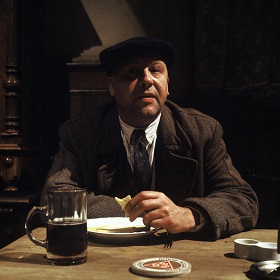
Alfred Döblin (10 augustus 1878 – 26 juni 1957)
Günter Lamprecht als Franz Biberkopf in de tv-serie uit 1980
De Oegandese schrijver Moses Isegawa (pseudoniem van Sey Wava)werd geboren op 10 augustus 1963 in Kawempe in Oeganda. Zie ook alle tags voor Moses Isegawa op dit blog en ook mijn blog van 10 augustus 2010.
Uit: Abyssinian Chronicles
“Apart from his secret fantasy, Serenity also wanted to learn how to play the fiddle. He could not get over the one-stringed moans, groans, sighs, screams, grunts and other peculiar sounds the Fiddler conjured, squeezed and rubbed out of the little instrument. The Fiddler’s visits formed the high point of his week, and the music was the only thing he listened to with pleasure uncoerced or influenced by adults or peers. He wanted to learn how to hold the instrument proudly against his shoulder and tune the string with a knot of wax. His aim was to charm strange women into his magic circle and keep them rooted there for as long as he wanted. In school he was known for his beautiful pencil drawings of fiddles. His wish never came true.
Grandpa, a Catholic, was unseated and replaced by a Protestant rival in a contest marred by religious sectarianism. As the fifties ended, his power gone and the heart taken out of his life, Grandpa’s homestead shrivelled as relatives, friends and hangers-on left one by one or in little groups. The women dropped out of his life, and the Fiddler took his talent elsewhere. By the time I was the age Serenity was when he ran up to strange tall women, Grandpa was living alone, sharing his house with the occasional visitor, relative or woman, a few rats, spiders and the odd snake that sloughed behind his heaps of coffee sacks.
Grandma, his only surviving sister, was also living alone, three football fields away. Serenity’s bachelor house, a trim little thing standing on land donated by both Grandpa and Grandma, separated the two homesteads. It was a sleepy little house, now and then kicked from the slumber of disintegration, swept and cleaned to accommodate a visitor, or just to limit the damage wreaked by termites and other destroyers. It only came alive when Serenity’s sisters or Uncle Kawayida visited and hurricane lamps washed it with golden beams. The voices and laughter made the rafters quiver, and the smoke from the open fire wound long spectacular threads round the roof and touched off distant memories.”
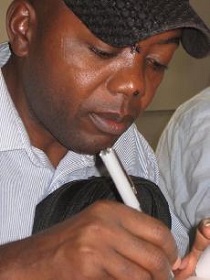
Moses Isegawa (Kawempe, 10 augustus 1963)
De Amerikaanse dichter en schrijver Mark Doty werd geboren op 10 augustus 1953 in Maryville, Tennessee. Zie ook alle tags voor Mark Doty op dit blog en ook mijn blog van 10 augustus 2010.
Brian Age Seven
Grateful for their tour
of the pharmacy,
the first-grade class
has drawn these pictures,
each self-portrait taped
to the window-glass,
faces wide to the street,
round and available,
with parallel lines for hair.
I like this one best: Brian,
whose attenuated name
fills a quarter of the frame,
stretched beside impossible
legs descending from the ball
of his torso, two long arms
springing from that same
central sphere. He breathes here,
on his page. It isn’t craft
that makes this figure come alive;
Brian draws just balls and lines,
in wobbly crayon strokes.
Why do some marks
seem to thrill with life,
possess a portion
of the nervous energy
in their maker’s hand?
That big curve of a smile
reaches nearly to the rim
of his face; he holds
a towering ice cream,
brown spheres teetering
on their cone,
a soda fountain gift
half the length of him
—as if it were the flag
of his own country held high
by the unadorned black line
of his arm. Such naked support
for so much delight! Artless boy,
he’s found a system of beauty:
he shows us pleasure
and what pleasure resists.
The ice cream is delicious.
He’s frail beside his relentless standard.
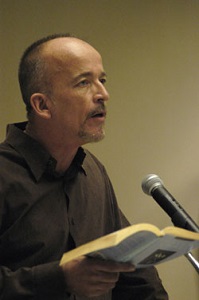
Mark Doty (Maryville, 10 augustus 1953)
De Poolse schrijver Jerzy Pilch werd geboren op 10 augustus 1952 in Wisla. Zie ook alle tags voor Jerzy Pilch op dit blog en ook mijn blog van 10 augustus 2010.
Uit: A Thousand Peaceful Cities (Vertaald door David Frick)
“A few minutes before six in the morning, Sexton Messerschmidt would climb the wooden steps, and in the gray dawn of the fall, in the winter darkness, or with the summer radiance piercing the shutters, the cast-iron caps would begin to move more and more forcefully. In the morning, the sound of the bells was delicate like the slowly rising eyelid of a Lutheran confirmation-class girl. At noon, it possessed the fullness of the fire roaring under Evangelical stovetops. And at twilight, it was mannerly and pliable like the mixed forests on Buffalo Mountain.
* * *
Sexton Messerschmidt knew how to pull the ropes such that he could achieve all those effects at will—the effect of the eyelid, the fire, and the mixed forest.
“You’ve got to have it here,” he pointed to his palms. “You’ve got to have the divine spark here. The divine azure spark,” he added with an enigmatic smile. “Without the divine spark, azure like a gas flame, no bell will ring.”
We would leave our packs in the sacristy. The church smelled of the Sunday clothes of Protestants. Sexton Messerschmidt carefully examined our hands.
“Not a single divine spark, not a trace of ability, to say nothing of talent,” he would say with disapproval. Oh well. Cripples have the right to praise the Lord too. Come unto me. Only the pious, only the most pious will attain today the grace of entry to the tower. You, Chmiel, you Sikora, you, Błaszczyk. Today it shall be given unto you. You won’t even have to put your hands over your ears, since, anyway . . . you are all deaf as posts.”
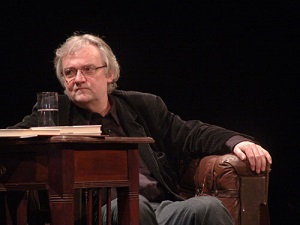
Jerzy Pilch (Wisla, 10 augustus 1952)
Zie voor nog meer schrijvers van de 10e augustus ook mijn vorige twee blogs van vandaag.
